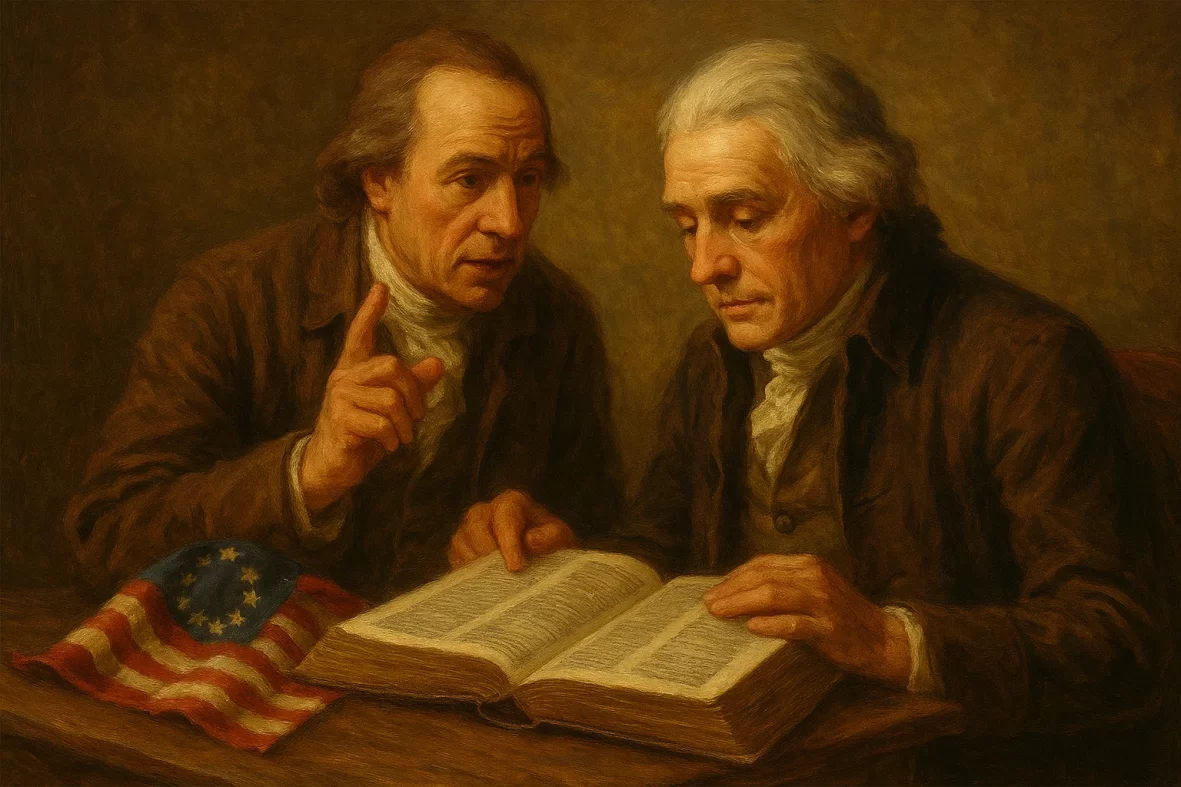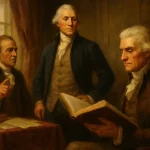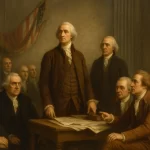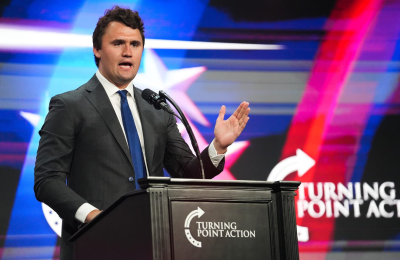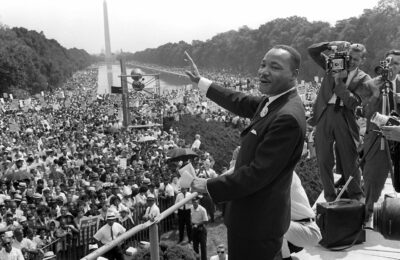Part 2 of the series: Faith and the Founding: A Theological Engagement with America’s Origins
May 29, 1776 – Watertown, Massachusetts. The wooden meetinghouse is packed on a warm election-day morning. Instead of a typical legislative chamber, the provincial congress and council have gathered in a church, as was New England custom. Rev. Samuel West ascends the pulpit. His chosen biblical text, Titus 3:1, exhorts believers to “be subject to principalities and powers, to obey magistrates” – an ironic choice, given that Massachusetts is in open rebellion against King George. The minister’s voice carries through the aisle: it is indeed a Christian’s duty to be a good subject of civil government, he declares. But then, with scholarly precision, West defines what legitimate government means. Those rulers “ordained of God”, he argues, are “only… lawful magistrates… who pursue the public good”, rewarding good and punishing evil . Any ruler who betrays that mission – a Nero, or by implication a George III – “ought not to be esteemed as the minister of God”, and “the authority of a tyrant is… null and void” . The congregation of patriot lawmakers nods. From the pulpit, revolution is being justified as a sacred duty. West’s rousing sermon, later printed and spread in pamphlet form, would be cited for its bold conclusion: “We ought to obey God rather than men” . In that moment, the pulpit and patriotism were one.
The Political Pulpit in Colonial America
Scenes like the above were not uncommon. Colonial America – especially New England – had a long tradition of “election sermons.” Each year, when a new colonial assembly or governor was installed, a clergyman was invited to preach before the civil authorities and citizenry. These were no perfunctory invocations; they were substantial discourses on governance, liberty, law, and faith. Through them, ministers became “interpreters of local and world events” for the people, mediators of the covenant with God for their community . In an era when weekly church attendance was expected, the clerical voice was heard more often – and likely more influential – than that of any politician .
Colonial preachers thus occupied a central place in public life. They offered not only spiritual counsel but also political commentary through a biblical lens . On special occasions (annual fast days, thanksgiving days, election days), their sermons explicitly addressed the affairs of state. Even outside New England, famous itinerants like George Whitefielddrew huge crowds and influenced colonial culture – so much so that Benjamin Franklin made brisk business printing Whitefield’s sermons . This fusion of piety and print culture meant that sermons often circulated as widely as political pamphlets. In fact, hundreds of sermons were reprinted during the founding era, “amounting to at least 10% of all pamphlets published”, according to political scientist Donald Lutz . These “pulpit pamphlets” made an outsized impact. Lutz’s comprehensive survey of American political literature from 1760–1805 found that the Bible was the single most cited source – about one-third of all citations in the corpus . (By contrast, Enlightenment authors like Montesquieu or Locke were cited far less.) The book of Deuteronomy alone was quoted more often than any secular work of political theory . This startling fact owed much to the sermons: Lutz notes that reprinted sermons accounted for nearly three-fourths of all biblical citations in the political literature of the time . The Apostle Paul was invoked about as frequently as Montesquieu . Scripture, in other words, saturated the rhetoric of the American founding – largely thanks to the preachers (Lutz, 1984, p. 191-192) .
Even staunch secularists of the Revolution acknowledged the pulpit’s power. John Adams frequently discussed sermons in his letters to Abigail, knowing they were bellwethers of public sentiment . Thomas Paine – hardly an orthodox believer – laced Common Sense (1776) with biblical allusions, essentially crafting a lay sermon to make the case for independence . On the other side of the Atlantic, British loyalists lamented the “Patriot preachers” as instigators of American unrest. Horace Walpole famously quipped that “Cousin America has run off with a Presbyterian parson”, pointing to the clergy’s role in sparking 1776. Small wonder that one modern historian calls the patriotic clergy of that era the “Black Regiment,” suggesting their preaching gowns were as vital to the Revolution as any minuteman’s musket.
Scripture and the Sermons of Liberty
What messages, exactly, thundered from those founding-era pulpits? In content and style, political sermons were often deeply expository, taking texts from Scripture and applying them to current circumstances. Ministers mined the Bible for principles of government, rights, and justice. They faced a theological challenge: how to reconcile the colonies’ bid for freedom with the New Testament commands to obey civil authorities (e.g. Romans 13:1-7 and 1 Peter 2:13-17). The way they resolved this tension profoundly shaped American political thought .
One key was distinguishing legitimate authority from tyranny. Patriot preachers taught that Romans 13’s call to be subject “to the higher powers” was not an unlimited blank check for rulers. Rather, as Rev. Samuel West explained in his 1776 sermon, Paul described the ideal magistrate – a servant of God who “secures and promotes the Happiness of society” by punishing evil and encouraging good . Such magistrates “are God’s ministers,” in West’s words, and to resist them is to resist God’s ordinance. But if rulers “pursue measures destructive of the peace and safety of the community, they forfeit their right to govern”, West concluded (1776/1983, p. 419) . This reasoning, rooted in covenant theology and natural law, turned Romans 13 from a stricture into a standard: when the king becomes a “tyrant… [his] authority is of itself null and void” . In that case, Christians not only may but “should… oppose”unjust governors – always with reverence for God’s higher law (West, 1776, as reprinted in Hyneman & Lutz, 1983) .
To bolster this conditional loyalty, patriot preachers invoked the Bible’s clear examples of God-fearing disobedience. They cited the Hebrew midwives who defied Pharaoh’s evil orders, Daniel who kept praying in defiance of a royal decree, and the apostles who told their magistrates, “We must obey God rather than men” (Acts 5:29). “The best characters were the likeliest to fall a sacrifice” under tyrants like Nero, West observed, reminding listeners that even St. Paul and the early Christians disobeyed sinful human commands . By highlighting such stories, the preachers normalized the idea that resistance to tyranny could be a Christian virtue. As one clergyman put it succinctly, “Rebellion to tyrants is obedience to God.” (This phrase was popular enough that Thomas Jefferson would later recommend it for the national motto.)
The Old Testament, too, provided rich templates for political reflection. 1 Samuel 8 – the story of Israel demanding a king – was a favorite text. Ministers recounted how the prophet Samuel warned Israel that a monarch would draft their sons for war, conscript their daughters, tax their fields, and enslave them, until the people cried out in regret (1 Sam. 8:10–18) . Colonial preachers drew a pointed analogy: Were not these the very abuses Americans feared from Britain? In 1775, as tensions with Parliament peaked, Rev. Samuel Langdon (president of Harvard College) preached that by choosing a king, Israel had essentially traded liberty for tyranny – a mistake the American colonies should avoid. The moral: God’s original plan for Israel was self-rule under God’s law (a kind of republic) rather than the despotic rule of kings . This biblical republic model emboldened Americans to believe that republican self-government was not only permissible, but even favored by God . As Daniel L. Dreisbach (2017) observes, many founders saw ancient Israel’s polity – especially under the judges – as a prototype for liberty, “a political system favored by God” .
Ministers also linked biblical covenant themes to the American cause. New England clergy were steeped in covenant theology – the idea that societies, like Israel of old, are bound in a covenant with God. They preached that if the colonies upheld virtue and faith, God would bless them with peace; if not, His protection might be withdrawn. It is no accident that Deuteronomy – with its blessings and curses for the nation – was the most quoted biblical book in Revolutionary literature . In countless sermons, verses like “Righteousness exalts a nation, but sin is a reproach to any people”(Proverbs 14:34) were applied directly to the fledgling states. The American War for Independence, then, was often framed not just as a political revolt but as a moral movement of a people seeking to live up to divine principles. Victory would depend on providence, and providence in turn on repentance. Pastors called their flocks to days of fasting and prayer, believing (and urging) that only a virtuous people could be free.
Blending Covenant Theology, Natural Rights, and Virtue
The political sermons of the founding era reveal a remarkable blend of theological and Enlightenment ideas. Rather than seeing faith and reason in conflict, Patriot preachers synthesized them. Their worldview drew from Reformation political thought (e.g. doctrines of resistance developed by Protestant thinkers) and from emerging Whig theories of natural rights – all filtered through Scripture. Scholar Ellis Sandoz notes that the American founding was not an either-or choice between secular Enlightenment and sacred religion; it drew on “both sacred and secular supports” . Nowhere is this more evident than in the election-day sermons.
For example, Rev. Abraham Williams (1727–1784) preached the Massachusetts Election Sermon of 1762, during a period of relative peace before the Revolution. Williams grounded the legitimacy of government in natural law as God’s law. “When Men enter into civil Societies, and agree upon rational Forms of Government,” he declared, “they act right, conformable to the Will of God, by the concurrence of whose Providence Rulers are appointed” (Williams, 1762, in Hyneman & Lutz, 1983, p. 105) . Here was social-contract theory given a biblical twist: forming a government is not just pragmatic but obedient to God’s design. The purpose of government, Williams continued, must be to “secure the Rights and Properties” of the people and promote their welfare . If that language echoes John Locke, the next line was pure Scripture: “Magistrates are God’s Ministers, designed for Good to the People” (an allusion to Romans 13:4).
Going further, Williams gave a classic definition of natural law in biblical terms: “The Law of Nature… is the Law and Will of the God of Nature, which all Men are obliged to obey.” In one sweeping sentence, he linked Enlightenment terminology (“law of nature”) with puritan theology (“God of nature”). This reflected a common assumption of the era’s clergy: all truth is God’s truth. If Enlightenment philosophers spoke of man’s natural rights and the laws of nature, those laws ultimately came from the Creator (often referenced as “the God of Nature” in 18th-century parlance). Thus, the struggle for rights was sacred, not merely secular. To fight tyranny was to restore the divinely ordained order in which each person could enjoy God-given liberty.
Other preachers echoed and expanded these ideas. Rev. John Tucker of Newbury (preaching an Election Sermon in 1771) argued from both Scripture and reason that government originates in the consent of the governed. “All men are naturally in a state of freedom,” Tucker proclaimed, and no one has inherent authority over another by birth. Therefore, “all right… to rule over others, must originate from those they rule over”, given by the people through a social compact . This was essentially Locke’s doctrine of consent – yet coming from a Congregationalist minister, it was undergirded by the theological notion that we are all equal creatures of God. In Tucker’s view, because each person answers to God, no one may be master of another without agreement. He and many colleagues also insisted that if the people are the source of a ruler’s authority, there are moral limits to that authority. As Tucker put it, the powers granted by the people “can be justly exercised, only within certain limits” agreed upon in the compact . If a magistrate oversteps – say, by violating fundamental rights – he breaks the covenant and the people may justly resist. These arguments closely paralleled those of Patriot theorists like Samuel Adams and John Adams; indeed, the sermons helped popularize high-minded political theory in language laypeople could appreciate.
Critically, the clergy tied these political theories back to biblical history and covenantal thinking. New England ministers saw parallels between their colonial assemblies and the covenanted tribes of Israel. Just as Israel of old demanded their God-given rights (1 Samuel 8, Numbers 27:4, etc.), so Americans sought the rights bestowed by “the God of Nature.” The concept of covenant infused American political thought via the pulpit: many sermons described the constitution (small “c”) as a mutual covenant – echoing both Lockean contract and biblical covenant. For instance, Rev. Samuel Cooper in 1780 preached at the inauguration of the Massachusetts state constitution, likening the new social compact to Israel’s covenant renewal under Joshua. This covenant ethos reinforced a sense of collective responsibility: if the nation stayed true to God’s standards of justice, it would prosper; if it turned immoral or oppressive, it would falter under God’s judgment. Such themes imparted a sober, ethical character to American patriotism. Far from a reckless rebellion, the Revolution was portrayed as a righteous cause under Providence’s watch.
Notably, many patriot-preachers did not shy away from applying biblical principles to all forms of oppression. In 1774, Rev. Nathaniel Niles delivered a powerful sermon series titled Two Discourses on Liberty. While celebrating the cause of American liberty, Niles also condemned the enslavement of Africans in the colonies. With prophetic sting, he warned his fellow patriots not to cry for freedom while denying it to others. “God gave us liberty, and we have enslaved our fellow-men,” Niles admonished. “May we not fear that the law of retaliation is about to be executed on us?” . This striking question – essentially will God judge us for oppressing slaves, just as we protest Britain oppressing us? – shows how biblical convictions cut both ways. Niles invoked the “law of retaliation” (lex talionis, the principle of justice in kind) to urge that the American quest for liberty be consistent and universal. His hearers were thus called to repentance for the sin of slavery even as they resisted British tyranny. It’s important to note that such anti-slavery rhetoric, though not yet mainstream, arose directly from Christian convictions during the Revolution . Evangelical preachers and dissident Quakers together kindled what would become America’s first abolitionist movement in those years – a fact often overshadowed, but one that underscores how biblical ideals of equality and stewardship influenced the founding ethos (Dreisbach & Hall, 2014).
Throughout the revolutionary pulpit oratory, one also hears a recurrent emphasis on virtue. The ministers understood liberty not as license to do whatever one wants, but as the freedom to do what is right. They stressed that a republic’s health depends on the morality of its citizens, and that morality in turn is nourished by religion. “With few if any exceptions, every founding-era statesman” agreed with this view, observes historian Mark David Hall – namely, republican government requires a moral people, and religion is indispensable to morality (Hall, 2019, p. 89) . This was so widely accepted that James Hutson has dubbed it the “Founding generation’s syllogism” . From the pulpit, pastors like Samuel Cooper, Ezra Stiles, and John Witherspoon hammered this point home. They preached that personal and civic virtue are two sides of the same coin: without private integrity, public liberty will not endure. As George Washington famously wrote (and preachers loved to quote), “Of all the dispositions and habits which lead to political prosperity, religion and morality are indispensable supports” (Washington, 1796/2020) . In short, the revolutionary pulpit called people not only to stand up to Britain, but to kneel before God. Fasting, prayer, and the cultivation of virtue were presented as patriotic duties. Christian citizens, they argued, should be the best citizens – diligent, honest, just, and ready to sacrifice for the common good. A favorite verse was Proverbs 14:34, “Righteousness exalts a nation.” It was cited in election sermons to remind leaders that no republic could flourish in vice or impiety(Dreisbach, 2017). This emphasis on virtue had practical ramifications: it undergirded support for education (to foster informed, moral citizenry), it encouraged frugality and industry, and it strengthened arguments for the freedom of religion (for true religion, they held, cannot be forced, yet is vital for virtue).
Indeed, one of the most profound contributions of these sermons was to articulate a vision of ordered liberty – liberty within the bounds of God’s moral law. The “lust of dominion” was denounced whether it appeared in a king or in an unbridled mob. Preachers balanced their encouragement of resistance with warnings against lawlessness and moral decay. In 1778, Rev. Phillips Payson told the Massachusetts Legislature that independence would collapse without societal virtue and the rule of law (Hyneman & Lutz, 1983, vol. 1, pp. 655–664). Even after the war, in the early republic, ministers continued to caution that the survival of American self-government required faith and good character. In 1790, for example, Rev. Jedidiah Morse (famed geographer and pastor) described immorality and irreligion as internal threats potentially more dangerous than any foreign army . Such exhortations helped lay the cultural groundwork for what Alexis de Tocqueville later observed: Americans saw religion as the guardian of their mores, and therefore of their democracy.
To summarize, the founding-era political sermons represent a rich synthesis: Biblical covenantalism, Reformation resistance theory (e.g. the right to resist unjust authority as argued by Calvinist resistance tracts), classical republican virtue, and Enlightenment natural-rights philosophy all mingled in the preacher’s message. This synthesis legitimized the American Revolution in the eyes of many pious colonists who might otherwise have balked at rebelling. It also left a lasting imprint on American political culture – an imprint that champions liberty but with moral responsibility, under God.
Faithful Civic Preaching vs. Modern Christian Nationalism
Given how overtly these founding-era pastors mixed religion and politics, a question naturally arises: Did they engage in Christian nationalism? In contemporary discourse, “Christian nationalism” is often defined as an improper fusion of Christian identity with American identity – a view that America should be an explicitly Christian nation in law, or that equates our country with God’s chosen people. It’s a charge critics raise when Christian rhetoric fuels a political agenda. Indeed, some of today’s observers might look at 18th-century sermons titled “The Election Sermon” or “The Dominion of Providence Over the Passions of Men” and worry that the pulpit was hijacked by political partisanship. They might be surprised to learn, however, that there were crucial differences between the faithful civic preaching of the founding era and the kind of “Christian nationalism” that draws concern today.
For one, the Patriot pastors did not idolize the nation; they held it accountable to a higher standard. Their message was not “our country right or wrong.” Rather, it was “our country must do right or God will not bless it.” In 1776, Rev. Samuel Sherwood gave a sermon that vividly illustrated this posture. Preaching from Revelation 12, he warned against the forces of tyranny and what he saw as false religion supporting it. Sherwood took a jab at the doctrine of unconditional obedience to kings (which some Anglican clergy espoused), calling such slavish submission one of “the frogs issued out of the mouth of the false prophet” (a striking biblical insult equating it with demonic propaganda) . While Sherwood’s language was hyperbolic, the sentiment was widely shared: blind patriotism that excuses evil was anathema to these preachers. They didn’t wrap the cross in the flag; if anything, they wrapped the flag in the cross, subjecting national aims to biblical ethics. Their ultimate allegiance was to God’s kingdom. The American cause was cherished because it seemed to align with God-given rights and justice, not because America was seen as infallible. In fact, as we saw with Nathaniel Niles and others, they were quick to critique American society’s own sins in light of scripture. This willingness to engage in national self-critique is the opposite of the uncritical, quasi-idolatrous patriotism that defines modern Christian nationalism (which often “confuses faith with patriotism, wraps the cross in the flag, [and] makes an idol out of the nation”, as one group of Christian leaders has put it) .
Secondly, the founding generation’s clergy were strong advocates of religious liberty, not the establishment of a state religion. This might seem paradoxical, given how unabashedly Christian their public rhetoric was. But consider: after winning independence, the same leaders (influenced by these sermons) wrote a Constitution that notably forbids any religious test for office and a First Amendment that bars a national church. Many of the patriot-preachers themselves – especially Baptists like Rev. Isaac Backus and Rev. John Leland – fought for the separation of church and state in order to protect the free exercise of faith. They believed Christianity should permeate the culture through persuasion and example, not through coercion by law. The 18th-century sermons did argue that biblical values ought to inform public policy (on justice, honesty, etc.), but they stopped short of saying the church should control the state or that civil law should enforce theological orthodoxy. In their view, true faith cannot be forced. This differentiates them from modern extremists who might advocate for a sort of de jure Christian state. The early American model – sometimes called “Christian republicanism” – presumed a predominantly Christian people whose values would naturally shape the laws, while guarding the freedom of conscience for all. As Mark David Hall documents, virtually all the founders agreed that religion (and specifically Christianity) was a wellspring of virtue and social order, yet they also embraced institutional pluralism (Hall, 2019) . The mentality was: Christianity is vital to our society’s success, but it must be voluntary. That is a far cry from a theocratic nationalism; it’s a form of principled public engagement compatible with plural democracy.
Finally, the tone and posture of the Revolutionary clergy were rooted in pastoral concern and humility, not triumphalist aggression. They certainly believed Providence had a role for America – many spoke of the “great purpose” God might have for this new nation. But that purpose was contingent on America’s obedience to God’s moral law and commitment to the common good. There was no doctrine of American exceptionalism as an entitlement; rather, it was a hope, tied to responsibility. Fast days were as important as victory celebrations. Contrast this with strands of modern Christian nationalism, where one sometimes finds a sense of automatic divine favor, or an anachronistic claim that the U.S. was explicitly founded as a “Christian nation” in a legal sense (a claim historians like Dreisbach and Hall find oversimplified – the founding was influenced by Christianity, yes, but not establishing a confessional state). The Revolutionary preachers acknowledged human sinfulness too deeply to trust any regime entirely. They helped inculcate the skepticism of power that led to checks and balances in our Constitution (Hall, 2020, pp. 204–206) . In short, their patriotism was chastened by original sin and guided by transcendent norms. This is worlds apart from a nationalism that sanctifies the nation itself.
To be sure, not every sermon was free of what we might call civil-religion excess. There were moments when biblical Israel and America blurred in pulpit rhetoric. A few preachers, especially during the war, implied a millennial destiny for America or spoke as if the colonies were a new Israel escaping Pharaoh (Britain). But these instances were relatively rare and often metaphorical. The mainstream view was more restrained and orthodox: God was using America, yes, but God would also judge America. The nation was under God, not equal to God. That is why even as they celebrated independence, many sermons warned that the success of the new Republic hinged on its righteousness and dependence on divine guidance . Such an outlook leaves no room for the pride and exclusion often associated with today’s “Christian nationalist” movements.
In summary, faithful civic preaching in the founding era engaged politics without surrendering the church’s prophetic voice. It was patriotic, certainly, but not in a way that confounded the kingdom of God with any kingdom of men. The pastors sought to infuse biblical truth into public life – about justice, human dignity, and moral order – all while upholding liberty of conscience. They believed Christianity’s principles were a blessing to the nation, not that the nation itself was the hope of Christianity.
Speaking Biblical Truth in Public Life Today
Reflecting on the political sermons of the founding era, thoughtful Christians today can find both inspiration and caution. The blend of warm piety and rigorous scholarship in those old sermons offers a model for how to engage public life with courage, clarity, and charity – the very qualities we often find lacking in modern discourse.
Courage. The patriot preachers were courageous in addressing the issues of their day head-on. Whether it was taxation without representation, unjust magistrates, or even slavery in our midst, they brought scripture to bear without fear of offending powerful interests. They did so at personal risk – remember that opposing the Crown was technically treason. Yet, because their ultimate trust was in God, they could speak truth to power. They exemplified the apostolic principle of obeying God over men when necessary. In our time, we too face pressing moral and social issues: sanctity of life, racial justice, care for the poor, the integrity of the family, religious freedom, and so on. Believers can take courage from the founding era pulpits to address these matters from a biblical perspective. Silence in the face of evil, the 18th-century pastors would remind us, is not a Christian option. Of course, our context is different – we are not in a revolutionary situation – but the need for moral courage is the same. It might mean graciously challenging our own government’s policies that violate biblical ethics, or standing up for the marginalized. As then, so now, true patriotism may sometimes require resisting popular opinion to uphold what is just.
Clarity. The political sermons of old were intellectually substantive. Ministers like West, Mayhew, and Nathanael Emmons wrote treatises that could engage the best minds of their day, yet they made them accessible to common folk by grounding arguments in familiar biblical narratives. This combination of academic rigor and clear illustration is something to emulate. In a time of sound bites and shallow debates, Christians in the public square should strive to articulate our positions clearly and winsomely, backed by solid reasoning. We have an advantage: a rich biblical vocabulary of themes (justice, covenant, creation, fall, redemption, hope) that can speak to universal human longings. The founding preachers used scripture to frame liberty in terms of responsibility, power in terms of stewardship, and rights in terms of God-given human dignity. We can do likewise. For instance, when advocating for a policy that protects the vulnerable, we might invoke the biblical principle that every person is made in God’s image. When discussing the limits of government, we can recall the warnings of 1 Samuel 8 about concentrated power. Such references, used appropriately, bring depth and moral weight to contemporary issues – and can do so in a way that resonates beyond the church walls. The key is to avoid jargon and to speak the truth in love, as Scripture enjoins (Ephesians 4:15).
Charity. Perhaps most importantly, the best of the founding-era preachers modeled charity in the public arena – that is, they spoke with a genuine concern for the souls of those listening, whether friend or foe. They were firm, yes, sometimes even severe in tone, but their aim was not to own the enemy but to win hearts to truth. They prayed for their enemies (even for King George, some did, that he might repent). They stressed civility – Samuel Adams, influenced by sermons, argued that debates must be conducted with respect and honesty . As Mark David Hall observed, the founders expected people to engage political disagreements with dignity, truthfulness, and mutual respect . We would do well to reclaim that ethic. Christian engagement today must not mimic the strident, us-versus-them nationalist rhetoric that often dominates media. Rather, it should be marked by the grace and forbearance taught by our faith. Our goal is not to destroy opponents but to persuade, and to uphold the common good. We remember that every person – including those who differ from us politically – is our neighbor whom we are called to love. That perspective changes how we communicate. The founding ministers, grounded in biblical teaching, understood the dangers of slander, false witness, and hatred, and they warned against these even as passions ran high. In our advocacy, whether from pulpits or public platforms, we too must display that “sweet reasonableness” that reflects Christ. It is possible to be warm and scholarly, principled and irenic – their example shows us how.
In conclusion, the “pulpit of the American Revolution” demonstrates that robust Christian engagement in public life is not only possible, but can be profoundly positive. Those pastors helped shape a nation’s conscience. They did so by preaching biblical principles to the issues of the day, by forging a collective identity around shared moral commitments, and by calling their nation to live up to God’s standards of justice and mercy. They balanced dual identities – as citizens of an earthly nation and as citizens of Heaven. When they cried “No King but King Jesus!” from their pulpits, it wasn’t a rejection of all earthly authority, but a re-calibration of authority under God. This gave them both the moral high ground and a servant’s humility.
Our context has changed, but the need for voices that speak truth with love into the public square has not. We can learn from figures like West, Niles, Williams, and their peers. They showed that love of God and love of country need not be at odds, if love of God remains supreme. They challenged their congregations to seek the welfare of the city (Jeremiah 29:7) – or the nascent nation – through prayer and principle. And they exhorted that ultimate hope must be in Christ’s gospel, not any government of men. By keeping that priority straight, they were able to be patriots without partisanship, prophets without cynicism.
As we navigate our divided times, Christians can carry forward the legacy of the founding era’s faithful civic preaching. We too can stand in our pulpits (literal or metaphorical) and speak biblical truth to our culture – courageously, clearly, and with charity. We can do so as an act of love for our neighbors and our nation, trusting, like those before us, that Providence smiles on truth and righteousness. Two and a half centuries ago, a generation of believers helped birth a free republic by wedding timeless truth to timely action. May we, with humility and wisdom, do likewise in our day – for the glory of God and the good of all people.
References
Dreisbach, D. L. (2017). Reading the Bible with the Founding Fathers. New York, NY: Oxford University Press.
Hall, M. D. (2019). Did America Have a Christian Founding? Separating Modern Myth from Historical Truth. Nashville, TN: Thomas Nelson.
Hyneman, C. S., & Lutz, D. S. (Eds.). (1983). American Political Writing During the Founding Era, 1760–1805 (2 vols.). Indianapolis, IN: Liberty Fund.
Lutz, D. S. (1984). The relative influence of European writers on late eighteenth-century American political thought. American Political Science Review, 78(1), 189–197.
Sandoz, E. (Ed.). (1998). Political Sermons of the American Founding Era: 1730–1805 (2nd ed.). Indianapolis, IN: Liberty Fund.



